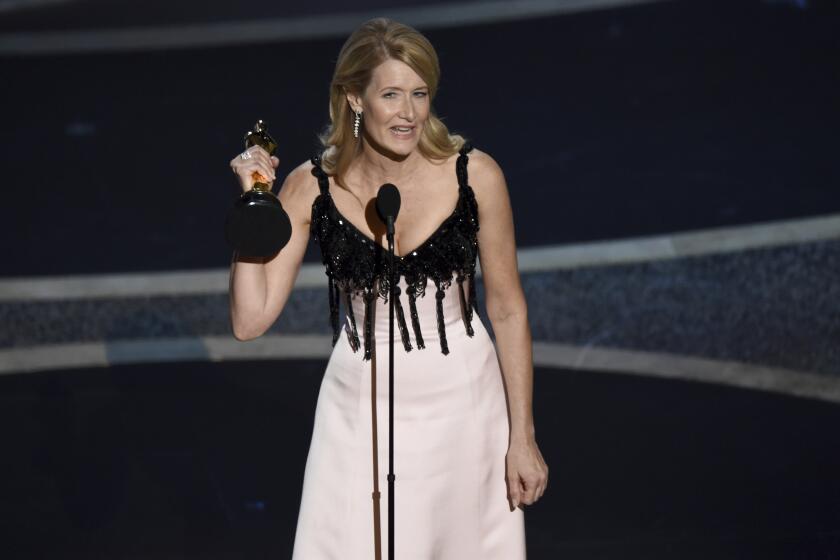Sorry, ‘Spider-Man,’ there are no blockbusters nominated for best picture. Unless we redefine the term

- Share via
If you’re looking for “Spider-Man: No Way Home” — the box-office sensation widely applauded by critics and audiences alike — among this year’s Oscar nominees for best picture, you may be in the wrong branch of the multiverse.
Even as streaming and the pandemic force the industry to reassess what makes a financially successful release, and as awards-show ratings decline across the board, the academy declined to include any of the year’s top 10 domestic-grossing films among those nominees. It’s actually possible the most-viewed of the Oscar nominees made less than $1 million at the box office: Netflix’s “Don’t Look Up” had only a qualifying run in cinemas, but has set streaming-hours records for the service.
We’re only four years past the academy’s widely derided decision to introduce a “best popular film” category to the Oscars, which was scrapped less than a month after it was introduced. And this year, instead of honoring movies designed to draw audiences exclusively to theaters, five of the 10 features nominated for best picture (“CODA,” “Don’t Look Up,” “Dune,” “King Richard” and “The Power of the Dog”) either debuted on or were quickly released to the streaming platforms Netflix, HBO Max and Apple TV+.
There are many caveats to all of this, including the fact that the HBO Max titles “Dune” and “King Richard” were also theatrical wide releases from Warner Bros. and found their way onto streaming only because of a decision made by corporate executives. That strategy now appears to be a fluke of pandemic-era distribution, and without it perhaps “Dune” might look more like the lone traditional “blockbuster” among the best picture 10. As it is, the epic sci-fi adaptation directed by respected awards darling Denis Villeneuve is the only one in the best picture field to top the $100 million mark domestically, just squeaking by with $107.6 million and ranking 13th for the year. (Worldwide, it made $398 million and ranked 11th.)
Lady Gaga is out and Kristen Stewart is in for the 2022 Oscars. Here are other major inclusions and omissions.
The theatrical exclusive “West Side Story” is the second-highest domestic grosser of the nominees with only $37 million. “King Richard” is third, with $14.9 million. Meanwhile, non-streaming nominees “Belfast” ($7.5 million), “Licorice Pizza” ($12.7 million) and “Drive My Car” (just under $1 million), have been racking up triumphs on the awards circuit — “Drive My Car” making it four years in a row the academy has nominated a non-English-language film after winning top awards from critics across the country — but not big box-office numbers.
For years, the steady dropoff of awards-ceremony television ratings has caused hand-wringing in Hollywood, and some have wondered if nominating more popular films increases viewership. For instance, the Oscars’ highest viewership (more than 55 million) saw popular juggernaut “Titanic” win in 1998; the very low numbers of recent years (less than 30 million viewers each year since 2018) saw a spike in 2019, when the popularity of blockbuster titles “Black Panther,” “Bohemian Rhapsody” and “A Star Is Born” may have contributed to an increase of 3 million viewers over the previous year.
However, the last Oscars before the pandemic took hold — the 92nd Academy Awards — boasted an unusual number of box-office hits, including the billion-grossing “Joker.” The winner, “Parasite,” enjoyed a $263-million worldwide haul. Yet despite six nominees topping $200 million worldwide — with an average gross among all nine landing at $292.3 million — the ceremony plummeted to its then-nadir of 23.6 million viewers in the U.S., throwing into question whether big grosses really do affect Oscar ratings.
Big ratings declines for the Grammys and Golden Globe Awards have the TV industry wondering how low the Oscars could go.
Last year’s awards — held in the pandemic purgatory from which grosses and viewership can’t be compared to anything before — scored just 10.4 million viewers, easily the lowest numbers in Oscar history.
If academy members had deliberately been striving to broaden the telecast’s audience this year, they might have included the lone billion-grosser of the pandemic thus far, “Spider-Man: No Way Home” (already the fourth-highest-grossing movie of all time domestically).
“Spider-Man” certainly has the blockbuster bona fides of the previous Marvel Cinematic Universe best-picture nominee, “Black Panther,” and similar levels of critical acclaim (93% on Rotten Tomatoes for “Spider-Man”; 96% for “Panther”). But “Spider-Man” didn’t earn the kind of rapturous reviews “Panther” did.
Likewise, the MCU’s “Shang-Chi and the Legend of the Ten Rings” enjoyed massive popular success and a fond reception from critics (91%), and like “Panther,” boasted one of the mega-franchise’s most intriguing villains (played by international superstar Tony Leung Chiu Wai) — but not the rabid support or cultural domination that could persuade academy voters. Meanwhile, the MCU’s “Eternals” arrived with potential awards-fodder credentials — Oscar-winning writer and director (Chloé Zhao), international cast, mythic subject matter — but received the worst collective reviews of any MCU film.
‘The Power of the Dog’ leads all movies with 12. What this year’s nominations mean for streaming, indie films and the overall future of the Oscars.
The only other top 10-grossing “popular film” with a credible shot at a best-picture nom was likely “No Time to Die.” Daniel Craig’s swan song as James Bond was the year’s seventh-highest domestic grosser and second-highest-grossing English-language film worldwide; it received a respectable 83% on Rotten Tomatoes and led all films by making five Academy shortlists: song, score, sound, visual effects, and makeup and hairstyling (it earned nominations for three of those: song, sound and visual effects). But though Craig’s run is beloved and highly successful, the “No Time” acclaim was — like “Spider-Man” — warm, not hot.
Other top grossers (“F9: The Fast Saga,” “Venom: Let There Be Carnage,” “Godzilla vs. Kong,” “Black Widow,” “A Quiet Place Part II”) are pure popcorn fodder; it probably would have surprised their makers more than anyone else had they been nominated.
It’s nothing new for the best-picture field to sport one or two blockbusters amid a smattering of adult-oriented dramas and art-house fare. Still, even given the pandemic’s effect on earnings, this year’s best-picture field’s box office dropoff seems precipitous — until one factors in streaming hours.
“Don’t Look Up” (55% on Rotten Tomatoes) has divided critics and is estimated to have scored less than $1 million in its limited, qualifying release. However, it shattered Netflix records for streaming hours in its first two weeks and has racked up nearly 400 million streaming hours so far, according to data released by the company. (Netflix does not release box office numbers and does not market its films with box office in mind.)
Netflix had 27 nominations, the most of any studio. Disney-owned companies and Warner Bros. fared well. Apple got its first best picture nomination.
How to fairly translate streaming hours to anything resembling box-office grosses is a mystery (considering multiple viewers per hours of streaming, home viewers’ behavior vs. willingness of consumers to go to a theater to see films, and other factors). However, “Don’t Look Up” also received nominations from the Producers Guild and Writers Guild, neither of which were achieved by, say, “Drive My Car.” Considering those massive streaming numbers, it just might be the year’s most widely seen best picture nominee.
Would “The Power of the Dog” suddenly look like a tentpole? Just counting its weeks in Netflix’s top 10 (the only data the company publicly releases), it logged more than 40 million streaming hours worldwide. With that kind of data available, would “Dune” and “King Richard” look more like blockbusters than their box office totals alone suggest? Possibly.
Meanwhile, ratings for awards shows are down across the board, not just for the Oscars or even just for movie awards. Whatever this year’s (probably low) Oscar ratings turn out to be, there are likely too many variables to draw any solid conclusions from them — blockbusters included or not.
More to Read
Sign up for The Envelope
Get exclusive awards season news, in-depth interviews and columnist Glenn Whipp’s must-read analysis straight to your inbox.
You may occasionally receive promotional content from the Los Angeles Times.











